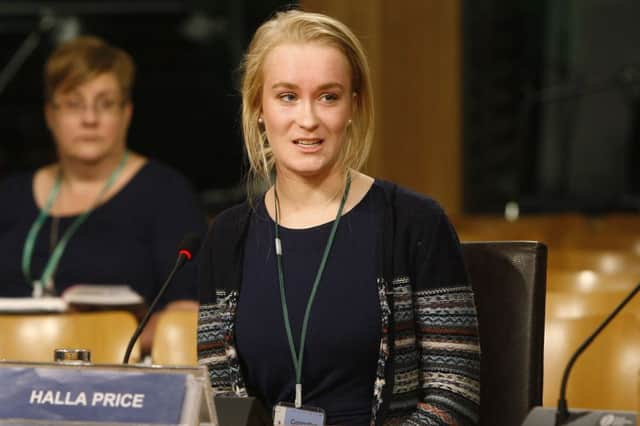Teachers lack skills to teach basic maths and literacy


The lack of time devoted to training teachers on the three Rs came to light as exhausted members of the profession revealed the stress of the job is forcing them to quit.
The alarming snapshot of the Scottish schools system was provided by teachers when they appeared before Holyrood’s education committee.
Advertisement
Hide AdAdvertisement
Hide AdLast night opposition politicians claimed the revelations were “shocking” and laid bare the SNP’s “terrible” education record.
Halla Price, a student primary teacher at Moray House in Edinburgh, said she did not believe everyone graduating from her course this year had “sufficient skill in numeracy to be able to teach it to 11-year-olds at a reasonable standard”.
Ms Price said she and her fellow students had received “valuable” training in the fundamentals of reading and writing in their first year. But that foundation was not added to in subsequent years.
“There wasn’t enough focus on the teachers themselves having the skills to teach numeracy other than a maths audit we completed ourselves in second year, which did very little in all honesty to improve our own knowledge and mathematical understanding,” she said.
William MacLeod, who is studying a postgraduate course to become a secondary technology teacher, said teacher training courses needed to focus more on maths.
Mr MacLeod said his course only devoted one week to literacy, but added the he was more concerned by numeracy issues.
“I would have more of an issue with numeracy because there is less chance for the university lecturers to see that we are numerate,” he said. “Going back to the basics on these would be helpful.”
The teachers appeared at Holyrood the day after official Scottish Government figures revealed that less than half (49 per cent) of S2 pupils perform well at writing – a fall from 64 per cent in 2012.
Advertisement
Hide AdAdvertisement
Hide AdThe data compiled by Scottish Survey and Literacy and Numeracy (SSLN) also showed that no progress has been made when it comes to closing the attainment gap that sees children from wealthy backgrounds outperform their poorer counterparts.
The SSLN also showed that the proportion of S2 children who were unable to write to the minimum standard rose from 7 per cent to 16 per cent. The figures followed last year’s Pisa global educational attainment results which showed Scotland was tumbling down the international rankings in maths, science and literacy.
More experienced teachers appearing in front of the committee spoke of the stresses and exhaustion caused by their workload.
And at a time when Education Secretary John Swinney is driving through reforms, one teacher criticised changes imposed by government.
Linda Robertson said: “Every time we get a new minister for education they want to make their role, they want to feel as if they have had an effect, so they change things. But do they necessarily change things for the benefit of the pupils? The latest Pisa results would suggest not.”
Ms Robertson was one of several teachers who wanted to leave before reaching retirement age. “Some days you can’t even go to the toilet or have lunch.
“That’s why you can’t keep teachers,” she said.
Another teacher, Angela Kelly, said she and her colleagues felt “what is being asked of us is no longer sustainable”.
Isabel Marshall said she was quitting as a primary head after 33 years in the profession.
“I have loved it but I am utterly exhausted,” she said.
Advertisement
Hide AdAdvertisement
Hide Ad“It’s been the breadth of social and emotional demands as well as the management demands which have meant I have reached that point where I feel I need to have a break.”
• CORRECTION: An earlier version of this article misquoted Halla Price as saying she did not believe “anyone” graduating from her course had “sufficient skill in numeracy”. It should have read “everyone”. We apologise for the error.